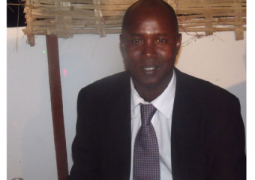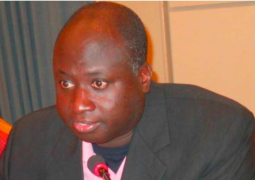We have our own story on this crucial matter, after we have looked for this particular MRC story online without success.
In any case, one would have thought that a story like that, at this time when the Ebola virus disease outbreak is of grave concern to us all, would have been made available by MRC to all the local news media, for them to properly inform and sensitize Gambians and the general population about the fact that this particular experiment is going to take place in their country.
But, perhaps more importantly, we have even wondered if the Gambian state was properly consulted and informed, before this piece of news was released to the world.
As MRC Gambia Unit director Professor Umberto D’Alessandro said in The Standard story, “thanks to the long-term collaboration between UK MRC and the Gambian government’s Ministry of Health,” it is our view that such an announcement should have been contained in a joint Gambia Government-MRC Gambia press release.
Assuming the Gambia government was not consulted about carrying out the GSK vaccine test in this country - before the announcement was made - and is yet to make up its mind about approving the testing in Gambia, then it is our humble view that “The Gambia” should not have been mentioned in the release i.e. until such time as the government was in the picture, and has OKed testing in this country!
We have also gone on to brood over certain Questions. The first Question is: Why Gambia where there is no Ebola virus disease outbreak? The other Question is: Will the guinea pigs in Gambia be really “volunteers”? How will they be selected? We ask these questions, for a good reason.
We know for a fact that Gambian children have served as guinea-pigs in a 1989 trial of a vaccine for hepatitis. Of course, we know that one particular baby’s consent was not obtained; but more disturbing was the fact that the parents were not informed nor asked if they wanted their child to be part of the experiment. The trial was simply included among the routine EPI vaccines administered to children whose parents attended the Polyclinic in Banjul.
The trial was to provide protection against liver cancer. More than two decades later, we are yet to be properly and clearly informed about the outcome of that experiment using our children.
Well, we’ve asked why Gambia? The answer, according to a report in The Standard newspaper report, is that “the [MRC] unit has the proven capacity and expertise to carry out trials to the highest quality standards, including trials for vaccines similar to this one…”
Are we being told that in DR Congo, where the Ebola virus disease outbreak was first reported since 1976; that all these years, WHO and the international medical community has not established well-equipped labs there for such experimentation?
What about doing the experiment in a country like Ebola-hit Nigeria? Surely, Africa’s biggest economy - with a very large population to spare - should have advanced medical and scientific centers to host such experimenting! Again, why Gambia?
The Standard story quoted Professor D’Alessandro as saying: “If tests in the first healthy volunteers in Oxford [UK] show the vaccine is safe and results in a good immune response, the trial will, after approval from the relevant authorities, be extended to healthy volunteers at the MRC Unit in The Gambia…”
Of course, that puts the onus on our own national authorities. We knew that approval must be sought, before using residents of the Gambia as guinea pigs. And this is where the relevant national authorities have the heavy responsibility to do what is in the best interest of the people in this country and humanity at large, of course.
Indeed, those who will have to give approval have an onerous responsibility, and we pray for them; for Allah’s guidance to make a good decision.
Whatever the outcome, including future benefits to Gambians and other populations at risk elsewhere in Africa and beyond, we have good cause to be worried about doing the vaccine testing on humans in The Gambia.
This is after coming across concerns and questions raised about tests carried out in Guinea, Sierra Leone and Liberia, which countries are now most affected by what is being called the biggest Ebola disease outbreak in history.
However, we are also aware that the Gambian state has had long experience in dealing with such medical and health issues, and are confident that the relevant authorities, based on protocols in place, will attend to this matter in a way which ensures that no harm comes to the population, should this experiment be allowed to be carried out here.
“A man without ethics is a wild beast loosed upon this world”.
Albert Camus



